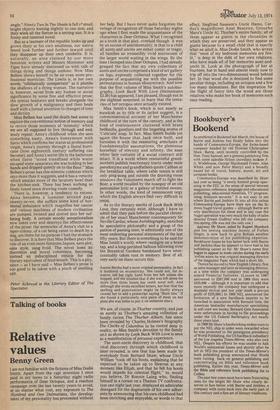Talking of books
Relative values
Benny Green
I am not familiar with the fictions of Miss Dodie Smith. Apart from the rapt attention I once paid in my teens to a Saturday night radio performance of Dear Octopus, and a resolute campaign over the last twenty years to avoid, at no matter what cost, any exposure to The Hundred and One Dalmatians, the development of my personality has proceeded without her help. But I have never quite forgotten the twinge of recognition all those Saturday nights ago when I first made the acquaintance of the characters in Dear Octopus. What I recognised as a truth in that play, overlaid though it was by an excess of sentimentality, is that to a child all aunts and uncles are either comic or tragic, all families an irresistibly vivid microcosm of the larger world waiting in the wings. By the time I bumped into Dear Octopus, I had already grasped the fact that my own collections of aunts and uncles comprised a kind of art gallery on legs, expressly collected together for the purpose of acquainting me with the possible permutations in human idiosyncracy. And now that the first volume of Miss Smith's autobiography, Look Back With Love (Heinemann £3.50) has appeared, I am pleased, though not in the slightest surprised, to learn that the tentacles of her octopus once actually existed.
Miss Smith's book, which is not nearly as mawkish as its title or its jacket suggest, is a commonsensical account of her Manchester childhood at the turn of the century, and is the kind of reminiscence cluttered with brass bedknobs, gaseliers and the lingering aroma of 'Cuticura' soap. In fact, Miss Smith builds yet again the house that Jack once built, and furnishes it with the reassuring armchairs of Fundamentalist assumptions, the plenteous horsehair of eternity and infinity, the neat white lace curtains of a social contract still intact. It is a world where resourceful grandmothers publish reactionary tracts under male pseudonyms and grandfathers quote Caliban at the breakfast table, where table tennis is still only ping-pong and outside the drawing room windows the Volunteers march off to fight the Boer, a world recalled by the nosegay of an old pantomime lyric or a galaxy of bottled sweets. In other words, the kind of reminiscent orgy which the English always find very difficult to resist.
As to the literary merits of Look Back With Love, they certainly exist, although I have to admit that they pale before the parallel chronicle of her exact Manchester contemporary Sir Neville Cardus, whose A utobiography, enriched, by speculative philosophy and a grasp of the pathos of passing time, is admittedly one of the most endearing personal statements of the last fifty years. But there is something to be said for Miss Smith's world, where verdigris on a brass tap, and a long-perished balloon billowing over the Botanical Gardens bandstand have unaccountably taken root in memory. Best of all, very early on there occurs this: Auntie Bertha had a most original personality, in fact it bordered on eccentricity. She could not, for instance, tell her right hand from her left unless she hopped; and she insisted that if she was left alone for more than three hours her teeth went soft. And although she wrote excellent letters, her fear that the spelling and punctuation might be faulty always caused her to add a postscript saying "Burn this." If she found a particularly nice piece of meat on her plate she was liable to put it on someone else's.
We are, of course, in Thurber country, and just as surely as Thurber's amazing collection of family curios The Thurber Album, has since been revealed by Charles_ Holmes's biography The Clocks of Columbus to be rooted deep in reality, so Miss Smith's devotion to the family un:t as shown by Look Back With Love is seen as a manifestation of personal experience.
The aunt-uncle discovery in childhood, that vital discovery through which childhood is later revealed, is one that has been made by everybody from Bernard Shaw, whose Uncle William "took off his boots, explaining that he expected to be taken up to Heaven at any, moment like Elijah, and that he felt his boots would impede his celestial flight," to, would you believe, Dr Ronnie Laing who, finding himself in a corner on a Thames TV confrontation one night last year, displayed an admirable disregard for the dogmatism of his own adherents by announcing that hisown childhood had been enriching and enjoyable, or words to that effect. Siegfried Sassoon's Uncle Hamo, Cardus'S magnificent Aunt Beatrice, Groucho Marx's Uncle Al, Thurber's entire family, all of them appear as giants in the chronicles in which they are preserved, and they appear as giants because to .a small child that is exactly what an adult is. Miss Dodie Smith, who writes that "most of my bedroom memories are firelit," is deep in the debt of her own relations, who have made all of her memories aunt-anduncle lit. Look at the photograph of her at fourteen, hat in hand and almost ready now to trip off into the two-dimensional wood behind her. In that wood she is destined to find some peculiar things, including an octopus and a few too many dalmatians. But the inspiration for the flight of fancy into the wood are those relatives who make her book of memories such easy reading.


































 Previous page
Previous page